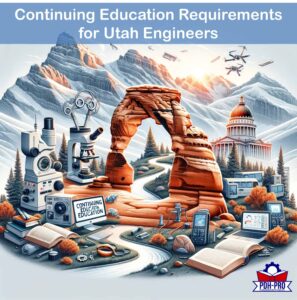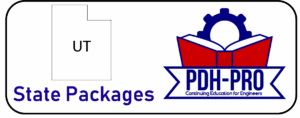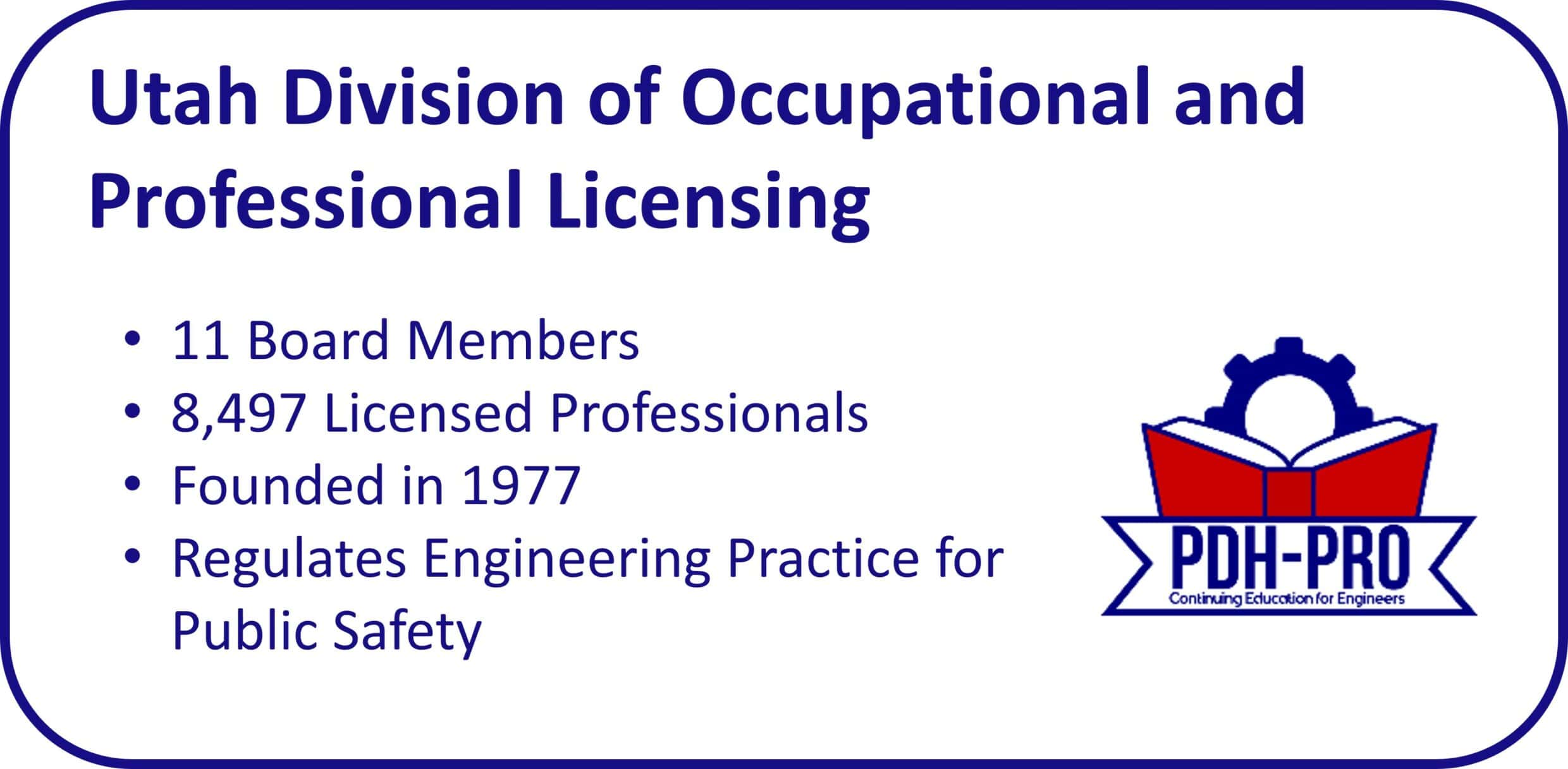CEU Requirements for Utah Professional Engineers
If you hold an engineering license in Utah, you need to know the continuing education requirement for Utah professional engineers.
The state of Utah continuing education requirements for professional engineers include completing 30 PDH hours biennially. The maximum number of continuing education hours that can be carried to the next renewable cycle are 15. The Board requires courses be technical in nature or aimed at improving the competence of the licensee. License renewal is March 31st of every odd year.
PDH-Pro offers complete packages for Utah Engineers that meet all of the Utah engineering board requirements.
For a complete list of all license renewal requirements check out our Utah PE renewal page.
Required PDH Credits for Utah Engineers
The renewal period for continuing education is biennial. This means that the renewal is after two years ending on 31st March of every odd numbered year. A professional engineer can renew a continuing education program and complete 30 hours of professional education. The Utah Professional Engineers and Professional Land Surveyors Licensing Board is the engineering board that oversees continuing education in the state of Utah. Utah laws, rules, and ethics for professional engineers are specific courses that one should undertake for licensing.
It’s important to take note that it’s a requirement for course providers to be pre-approved so that they offer what is expected by the state’s licensing board. Of interest still, professional engineers are also allowed to have electronic renewal. Online courses are accepted but there should be a test to show that the registrant has gone through the course material. Also, the board requires you to submit certificates of completion for continuing education credits. Moreover, a professional engineer shall keep records of completed continuing professional education for 4 years after the end of the two years to which the records pertain.
Utah PE License Renewal Dates
Renewal dates for continuing professional education are on the 31st March of odd-numbered years. The renewal works biennially. This means that after every two years, another cycle of continuing professional education takes place. For example, if you entered the program on the 31st of March 2019, the period of your continuing professional education will end on the 31st of March 2021. By the time the two years are over, you will have completed 30 PDH hours. The learning involves ethics, technical, and business course material that improves the skills and competencies related to the licensee’s area of practice. As a professional engineer, you will have to keep records of your continuing education for a time-frame of 4 years after the end of your two-year learning period.
Engineering Ethics and Professional Conduct
Engineering ethics and professional conduct are significant when one is taking continuing education. Courses in ethics, professional conduct, as well as state laws/rules are paramount for professional engineers. For example, ethics course material is vital in helping a professional engineer to develop the moral principles needed to govern his or her conduct in professional practice. Moreover, professional conduct learning is essential in instilling the professional values that professional engineers should portray. In addition, continuing education involves state rules/laws so that professional engineers can know the specific regulations of their states. Abiding by the engineering rules of the state of Utah is a requirement for all professional engineers practicing in the state.
Records Keeping Requirements for Utah Engineers
Record keeping is a requirement for professional engineers. They are required to keep records for four years once the two year period of their continuing education comes to an end. The evidence that the board accepts as an indication of the completion of the continuing program is 30 PDH hours. The records are provided to the board when one is seeking for a licensing.
Continuing Education Activities Accepted by the Board
Continuing education activities that are accepted by the board are the ones that are approved by the state board. If, for instance, the provider of the course is not approved by the state board, the continuing education activities will not be accepted by the board. These activities include: attending engineering PDH webinars, participating in engineering conference, and enrolling for a PDH online course.
Online courses are allowed in a continuing education program as long as there is a test to show that the registrant has managed to go through the course material. Live webinars are integral in offering convenience to busy professional engineers who can’t manage to attend on-site classes. It’s important to note that self-study courses are allowed if you are thinking of enrolling for them. A maximum of four hours is recognized for the preparation of papers and articles related to your practice and then submitted for publication.
Pre-Approval of Continuing Education Activities
The board has the right of pre-approving continuing education providers and courses to make sure that they are offering the relevant course material for professional engineers. Not all course providers and courses count towards the continuing professional education for engineers.
Sources of Free Continuing Education Courses
There are websites that offer free continuing education courses to professional engineers. Also, some of the top universities can be offering free courses. Being up to date with the latest information can help you to know the free courses available.
Utah Engineering Licensing Requirements
The following are the requirements for engineering licensing:
- A bachelor’s degree in engineering
- Passing the fundamentals of engineering exam- tests one’s knowledge on basic engineering concepts and principles.
- A four-year progressive engineering practice
- Passing the principles and practice in engineering exam- tests one’s knowledge and competence in his or her specific engineering discipline.
Engineering Discipline Restrictions for Continuing Education Courses
There are no restrictions for continuing education courses in regards to discipline. For example, if you are an electrical engineer, you can complete continuing education activities in another discipline (e.g. civil), provided it will improve your skills and knowledge. This allows you to expand your knowledge base into other areas, which makes you a well-rounded professional.
Complete Engineering Packages for Utah PEs
 PDH-Pro reviews the license renewal requirements for the State of Utah to be certain our courses meet the board requirements. Our Utah Engineering Packages provide a cost-effective and conenient way for engineers to renew their license. These CEU packages were developed along engineering disciplines – chemical, civil, electrical, environmental, geotechnical, mechanical, and structural. Our professional development packages allow you to focus on technical matters without having to worry about the CEE requirements.
PDH-Pro reviews the license renewal requirements for the State of Utah to be certain our courses meet the board requirements. Our Utah Engineering Packages provide a cost-effective and conenient way for engineers to renew their license. These CEU packages were developed along engineering disciplines – chemical, civil, electrical, environmental, geotechnical, mechanical, and structural. Our professional development packages allow you to focus on technical matters without having to worry about the CEE requirements.
Conclusion
In conclusion, if you are a professional engineer in the state of Utah, the above-mentioned are the requirements that you should meet in order to be part of a continuing education course. Being a professional engineer requires you to take continuing education courses to improve your knowledge and skills in your area of engineering specialization. This will make you more relevant and competent in your area of practice.

